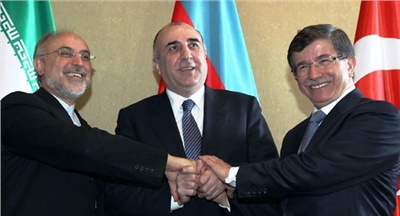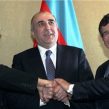
Azerbaijan Seeks Warmer Ties With Iran
Publication: Eurasia Daily Monitor Volume: 11 Issue: 216
By:

Ongoing tensions between Azerbaijan and Iran have filled the press in both countries for the past five years. However, these bilateral frictions have begun to deescalate since Azerbaijani President Ilham Aliyev’s visit to Iran on April 16, 2014. And last month (November 12–13), newly inaugurated Iranian President Hassan Rouhani (he assumed office on August 4) visited Baku. His delegation included presidential aides and ministers of oil, foreign affairs, roads, communications and information technology, and economy, as well as the governor of the Central Bank of Iran (Iran News, November 13). Since acceding to the position of Iranian head of state, Rouhani met with Aliyev in Davos, Tehran, Astrakhan and, now most recently, in the Azerbaijani capital.
According to Rouhani, the meetings between the two presidents have taken place in four stages, and these progressive summits were important steps in improving bilateral relations. Rouhani emphasized that he was keen on developing the relations between the two countries in all directions. While major stumbling blocks persist, such as questions on the utilization of the Caspian Sea (Trend News Agency, November 13), Aliyev echoed Rouhani’s hopes that dialogue between the two countries would continue moving forward in a positive direction (Qafqazinfo, November 13).
During the Rouhani-led delegation’s visit to Azerbaijan this past November, Iranian Central Bank head Veliyullah Seyfi noted that although the trade volume between the two countries is good, cooperation in the banking sector is not at the desired level. But he asserted that “cooperation between the two countries in this area will improve following the removal of [international] sanctions against Iran” (Olaylar News Agency, November 13). In addition, during Rouhani’s visit to Azerbaijan, the Azerbaijan-Iran business forum was held at the Heydar Aliyev Center in Baku, on November 13 (Trend News Agency, November 13).
Turkey has played a key role in helping Iran and Azerbaijan overcome the tensions in their bilateral relationship. In particular, Ankara has been instrumental in establishing and mediating a tri-partite diplomatic dialog. The first such tri-partite meeting was held in Urmia, Iran, on April 16, 2011, and the second one took place in Nakhchivan, Azerbaijan, on March 7, 2012 (Bilgesam, January 17, 2012). The scope of these inter-governmental gatherings was to take shared action on issues concerning all three countries and to start negotiations on outstanding conflicts among them. The final trilateral meeting took place in Van, Turkey, on March 14, 2014, at the invitation of Turkish Foreign Minister Ahmet Davutoglu with the participation of his Azerbaijani and Iranian counterparts, Elmar Mamadyarov and Cevad Zarif, respectively (mfa.gov.tr, March 14).
The years of tense relations between Azerbaijan and Iran can be traced all the way back to the end of the Cold War. After the collapse of the Soviet Union and the breakout of war in Karabakh, the countries in and surrounding the South Caucasus roughly split into two competing, opposed groups: Russia, Iran and Armenia versus Turkey, Azerbaijan and Georgia. The former was often considered an anti-Western coalition, whereas the latter three states were encouraged by the West to cooperate more closely to become an alternative energy corridor for Caspian oil and natural gas exports to Europe. As such, the Ankara-Baku-Tbilisi grouping also possesses the quality of being an axis of political integration.
Although for decades finding themselves on opposing sides of the geopolitical struggle for influence in the South Caucasus, the most stressful period in Azerbaijani-Iranian relations arguably occurred during the presidency of Mahmoud Ahmadinejad (2005–2013). This tension was particularly exacerbated by the warming of Azerbaijani-Israeli relations as well as the serious strain in ties between the United States (an important partner to Baku) and Iran regarding the latter’s nuclear program. The constant perceived danger of war erupting between the US and Iran, coupled with Azerbaijan’s military partnership with the North Atlantic Treaty Organization (NATO), made Tehran feel like it was surrounded by enemies that challenged its state security.
In addition to Azerbaijan’s close partnerships with Israel and the US, another important factor explaining Baku’s friction with Tehran was a statement made by President Aliyev in 2007. Specifically, the Azerbaijani head of state declared: “I am the president of all Azerbaijani people” (Azerbaijan Parliament, May 8, 2007). Roughly 30 million Azerbaijanis live in the world, including the more than eight million ethnic Azerbaijanis who live in Azerbaijan itself (stat.gov.az, May 12). And in Iran, Azerbaijanis (about 13 million people) make up roughly 16 percent of the entire population (CIA World Factbook, June 22). Consequently, the Iranian government received Aliyev’s remarks with alarm, seeing them as a potential catalyst for separatist tendencies among Iran’s Azerbaijanis. On the other hand, Aliyev’s remarks and Baku’s support for Azerbaijanis inside Iran were motivated by Tehran’s continuing attempts, since the end of the Cold War, to export its Islamic Revolution to Azerbaijan via sympathetic Shiite groups.
This latest trend of warming bilateral relations, therefore, appears to be important to Baku for both domestic as well as foreign policy reasons. On the foreign relations front, Azerbaijan intends to benefit from the ongoing normalization in Iranian-US relations. And in moving closer to Tehran, Baku also hopes to prevent the further intensification of Iranian-Armenian ties. Notably, Iran has continued to assist Armenia in circumventing the economic blockade imposed jointly by Azerbaijan, Georgia and Turkey following the Karabakh war. Hence, Azerbaijan is planning to break the axis of Russia, Armenia and Iran in the South Caucasia by seeking a balanced foreign policy with Iran. If realized to its full potential, it will seal off Armenia’s last direct link to global markets through its shared border with Iran.
Secondly, by straightening out its relation with Iran, Azerbaijan wishes to end the radical activities of domestic, Tehran-backed Shiite groups who oppose the secular regime in Baku. In the past, during periods of heightened bilateral tensions, Iran has acted to create instability by promoting protests against Aliyev’s government in Azerbaijani areas with higher proportions of Shiites. Such Iranian support for radical Azerbaijani Shiite groups, although not evident in official government communications, can be clearly observed on Iranian television channels that broadcast in Azerbaijani.
Recent diplomatic successes notwithstanding, further zigzags in Iranian-Azerbaijani bilateral relations are likely to continue since Iran is unlikely to completely alter its foreign policy orientation in the South Caucasia over the short term. Moreover, it remains to be seen whether US-Iran relations—which have a direct impact on relations between Baku and Tehran—will continue to improve, or whether they are destined to be short lived.




